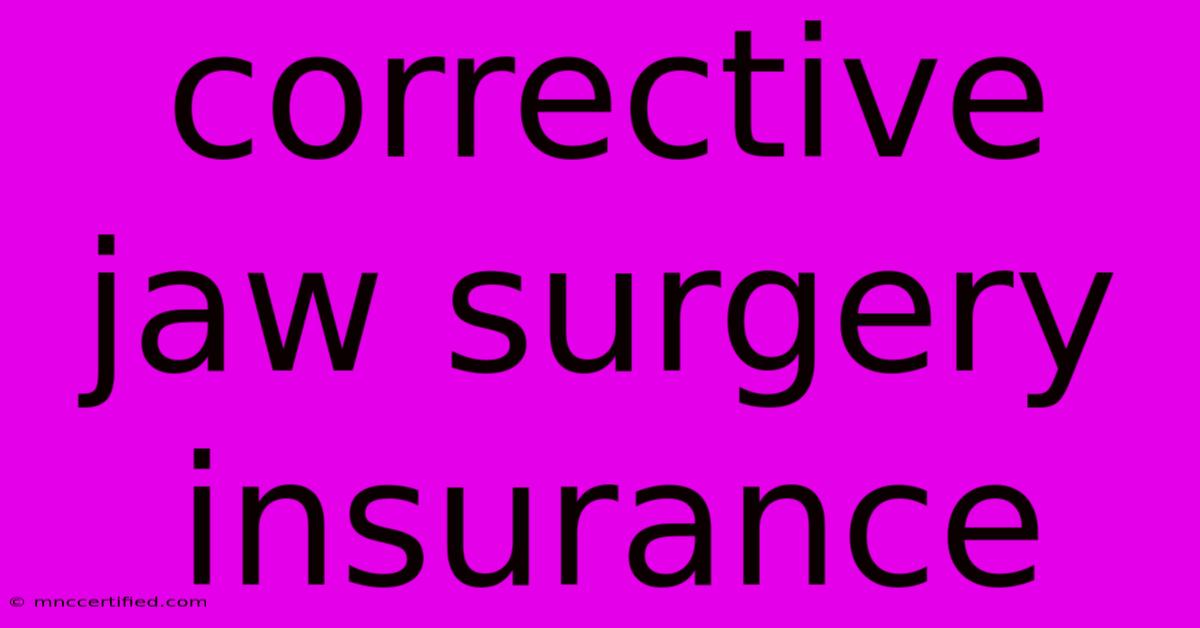Corrective Jaw Surgery Insurance

Table of Contents
Corrective Jaw Surgery: Understanding Insurance Coverage
Corrective jaw surgery, also known as orthognathic surgery, can dramatically improve both the function and aesthetics of your bite and facial structure. However, the cost of this procedure can be substantial, leading many to wonder about insurance coverage. This comprehensive guide will explore the intricacies of obtaining insurance coverage for corrective jaw surgery.
What is Corrective Jaw Surgery?
Corrective jaw surgery addresses skeletal discrepancies in the jaw, correcting misalignments that can cause problems like:
- Malocclusion: This refers to a bad bite, where the upper and lower teeth don't meet properly.
- TMJ disorders (Temporomandibular Joint Disorders): Pain and dysfunction in the jaw joint.
- Sleep apnea: A condition where breathing repeatedly stops and starts during sleep.
- Difficulty chewing or speaking: Caused by jaw misalignment.
- Facial asymmetry: An uneven appearance of the face.
Does Insurance Cover Corrective Jaw Surgery?
The answer to this question is unfortunately not a simple "yes" or "no." Insurance coverage for corrective jaw surgery varies significantly depending on several factors:
- Your insurance provider: Different insurance companies have different policies and coverage limits. Some may cover medically necessary procedures, while others may not.
- Your specific policy: Even within the same insurance company, different policy plans offer varying levels of coverage. Carefully review your policy's details, including the specific wording regarding "orthodontia" and "orthognathic surgery."
- Medical necessity: This is the most crucial factor. Insurance companies typically only cover corrective jaw surgery when it's deemed medically necessary, not solely for cosmetic reasons. This means your surgeon needs to provide compelling documentation demonstrating a clear medical need for the surgery. This often involves detailed records, including x-rays, models, and a thorough explanation of the functional issues being addressed.
- Pre-authorization: Most insurance companies require pre-authorization before the surgery. This involves submitting all necessary medical documentation to your insurance provider for review and approval before the procedure is scheduled. Failure to obtain pre-authorization can result in significantly higher out-of-pocket costs.
What constitutes "medically necessary"?
"Medically necessary" generally refers to situations where the surgery is required to address significant functional problems, such as:
- Severe TMJ disorders: Intractable pain and dysfunction unresponsive to conservative treatments.
- Severe sleep apnea: Where other treatments have failed to improve breathing.
- Severe malocclusion impacting chewing, speaking, or swallowing: Significant functional limitations.
Cosmetic reasons vs. Medical necessity: A crucial distinction
If the primary reason for seeking corrective jaw surgery is purely cosmetic, insurance coverage is highly unlikely. The emphasis must be on the functional improvements. Your surgeon will need to clearly articulate the medical necessity in the documentation submitted to your insurance provider.
Maximizing Your Chances of Coverage
To increase your likelihood of securing insurance coverage:
- Choose a board-certified oral and maxillofacial surgeon: These surgeons have the expertise to properly document your medical necessity.
- Thorough documentation: Ensure your surgeon meticulously documents all aspects of your condition, including the functional limitations and the expected benefits of the surgery.
- Pre-authorization: Never skip this crucial step. Contact your insurance company well in advance to understand their requirements and submit all necessary documentation.
- Appeal denied claims: If your claim is initially denied, don't give up. Carefully review the reason for denial and work with your surgeon to prepare a strong appeal. Many successful appeals highlight the improvements in quality of life resulting from the surgery.
- Explore alternative payment options: Consider medical financing options or payment plans if your insurance coverage is insufficient.
Conclusion: Proactive Planning is Key
Securing insurance coverage for corrective jaw surgery requires proactive planning and thorough communication with your surgeon and insurance provider. Understanding the requirements for "medical necessity" and diligently following the pre-authorization process are crucial steps to maximizing your chances of coverage. Remember, open communication and detailed documentation are your best allies in navigating the complexities of insurance coverage for this significant procedure.

Thank you for visiting our website wich cover about Corrective Jaw Surgery Insurance. We hope the information provided has been useful to you. Feel free to contact us if you have any questions or need further assistance. See you next time and dont miss to bookmark.
Featured Posts
-
Coachella 2025 Complete Lineup Announced
Nov 21, 2024
-
Insurance Companies In Kalamazoo
Nov 21, 2024
-
Direct Orthopedic Care Insurance
Nov 21, 2024
-
Fortnite Servers Down 32 11 Update And New Skin
Nov 21, 2024
-
16 40 An Hour Is How Much A Year
Nov 21, 2024